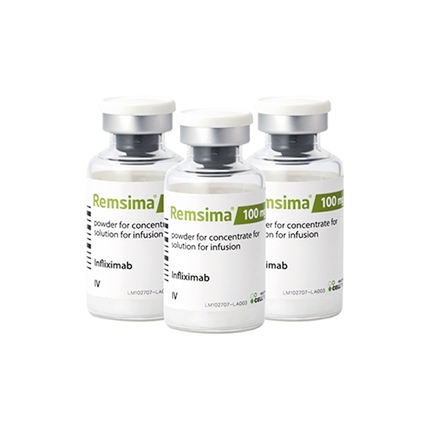- Bone Health
- Immunology
- Hematology
- Respiratory
- Dermatology
- Diabetes
- Gastroenterology
- Neurology
- Oncology
- Ophthalmology
- Rare Disease
- Rheumatology
Remsima Delivers Positive Results in IBD Switching Study
Studies of the infliximab biosimilar Remsima in patients with inflammatory bowel disease were presented at United European Gastroenterology Week 2021.
Investigators have reported positive findings from 2 studies of patients with Crohn disease (CD) or ulcerative colitis (UC) who switched from intravenous (IV) administration of the infliximab biosimilar Remsima (CT-P13) to subcutaneous (SC) administration.
Results from the inflammatory bowel disease (IBD) investigations were presented in poster form at United European Gastroenterology (UEG) Week 2021, being held virtually this week. Remsima is a Celltrion product.
In a randomized, controlled trial, investigators enrolled 65 patients (CD, 25; UC, 40) in the IV arm in which they received CT-P13 (5 mg/kg every 8 weeks from week 6 through week 22). At week 30, patients were switched to SC administration every 2 weeks until week 54 (dose 120 mg or 240 mg for patients < 80 kg or ≥ 80 kg, respectively).
Investigators noted favorable outcomes in the SC group for pharmacokinetics, efficacy, and potentially, immunogenicity, they wrote.
A significant difference in Ctrough (lowest drug concentration prior to the next dose) before and after switching was observed (median Ctrough levels at 2.05 μg/mL; interquartile range [IQR], 0.10-3.61) and 21.10 μg/mL (IQR, 11.30-26.50, respectively; P < .00001).
They said the proportion of patients with Ctrough exceeding target exposure (5 μg/mL) was significantly higher after the switch (36/41, 87.80%) than before (8/41, 19.51%; P < .00001).
They said clinical response rates were comparable at pre- and post-switch timepoints (81.63% vs 89.80%, respectively; P = .3873).
Fecal calprotectin levels were significantly lower after switching, and antidrug antibody and neutralizing antibody levels were lower after switching, although these latter findings were not statistically significant.
Second Study Findings
In the second study of CT-P13 also presented at UEG, patients with CD or UC who were treatment naïve to tumor necrosis factor inhibitors were initiated on CT-P13 IV at weeks 0 and 2, after which they were randomized to IV or SC therapy at a dosage of 120 mg for patients < 80 kg or 240 mg for patients ≥80 kg every 2 weeks from week 6 until week 54.
Investigators said 37 patients received monotherapy and 29, combination therapy. No significant difference was observed in the number of patients with Ctrough levels exceeding the target exposure, and both groups exceeded target exposure throughout the study period (5 μg/mL; 96.55% vs 95.83%, respectively).
Clinical response rates were comparable between arms and despite concomitant use of immunomodulators in the combination therapy arm, no difference in immunogenicity between arms was observed.
“The post-hoc analysis indicates that switching from IV to SC infliximab will deliver comparable clinical outcomes for patients with IBD, including those with Crohn disease and ulcerative colitis, further highlighting the potential of SC infliximab as an alternative administration route. Infliximab SC offers patients and caregivers the possibility of more convenient care with the potential for in-home use,” said Walter Reinisch, director of clinical IBD study group in the Department of Gastroenterology and Hepatology at the Medical University of Vienna.
“These exploratory results suggest that SC infliximab monotherapy may provide comparable clinical outcomes and immunogenicity to combination therapy with immunomodulators, thereby advancing the concept of SC infliximab monotherapy as a viable treatment option for IBD patients,” said Shomron Ben-Horin, MD, of the Department of Gastroenterology at Chaim Sheba Medical Center in Israel.
Newsletter
Where clinical, regulatory, and economic perspectives converge—sign up for Center for Biosimilars® emails to get expert insights on emerging treatment paradigms, biosimilar policy, and real-world outcomes that shape patient care.

